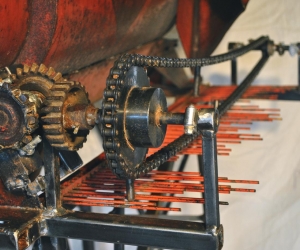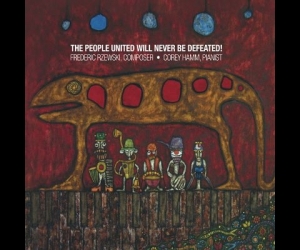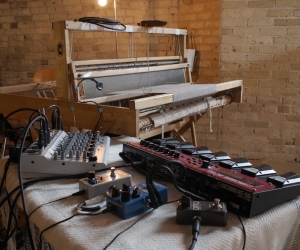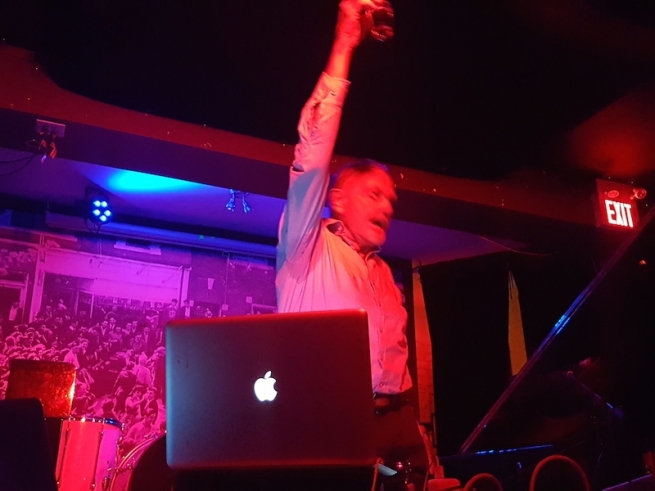
On an unseasonably warm night in October, Toronto’s Monarch Tavern was packed to the rafters for a living legend. German electronic and ambient music pioneer Hans-Joachim Roedelius—best known as a cofounder of 1970s experimental groups Cluster and Harmonia, renowned for their celebrated collaborations with Brian Eno—sat behind the bar’s piano with a pair of glowing laptops. His fingers glided across the keys with the deft touch of an old master, yet his gleeful energy was that of a man one quarter of his age.
In a room so silent that you could hear the swirling of drinks, the beeping of the debit machine, and motorcycles growling outside, Roedelius transfixed the crowd with selections spanning his six-decade career. His wife Christine Martha joined him for a duet rendition of Brian Eno’s “By This River,” a song Roedelius originally cowrote and recorded in 1977. Later, he dedicated his performance of Cluster’s “The Shade” to the recently deceased Holger Czukay of Can with a hearty bellow of “Heil Holger!” In performance, Roedelius, now eighty-two, presented his ongoing explorations with both wistful nostalgia and joyful welcoming of the future.
After making significant contributions to the canon of “Krautrock”—a humourous term (coined by, depending on whom you ask, British DJ John Peel or the UK magazine Melody Maker) for the wide-ranging experiments of German musicians since the late 1960s—Roedelius has continued to venture through new age, techno, and neoclassical forms, releasing as many as eight albums per year. The latest names in his long list of collaborators include Stephan Schneider of post-rock group To Rococo Rot, ambient-jazz trio Aquarello, the rechristened Qluster, and composer Christopher James Chaplin (the youngest son of Charlie Chaplin). Yet, whether teaming up or recording solo, Roedelius has perpetually shunned traditional song structures with the playful yet passionate modes of improvisation he calls “painting with sound.”
The 2008 album Inlandish, one of five that Roedelius has recorded with Philadelphia electronic artist and film composer Tim Story, is an apt example of his modern-day modus operandi: elegantly simple piano melodies washed over with burbles of modular synth, sighing strings, and surprise onslaughts of stuttering beats. As reviewer Chris Jones wrote for the BBC, “to call it ‘ambient’ is to do it a disservice, for these are tunes that wiggle and shimmer into the ears, gently refusing to melt into background noise.”
The same could be said for Roedelius’ Toronto performance, as he abruptly stopped his mesmerizing music to thank audience members, other artists on the bill, or the Monarch Tavern’s sound engineer Jess Forrest (aka Krautrock-inspired electronic musician Castle If). These moments punctuated the room’s polite silence with the animated exclamations that have defined Roedelius’ life’s work.
Roedelius began his creative life in Berlin as a child actor before cofounding Human Being, the experimental music commune that provided many of his formative experiences. During an interview the day after the Toronto show, alongside his wife Christine Martha, he detailed how this small group of nonmusicians (among them, a graphic designer, a restaurant server, and an American draft dodger) “started experimenting with alarm clocks and feedback, trying to find whatever sounded right to our ears.”
Human Being evolved into the Zodiak Free Arts Lab, a late-night hotspot in the basement of a theatre where Roedelius was joined by actors, directors, and early Tangerine Dream member Conrad Schnitzler. Together with musician Dieter Moebius, they formed the proto-industrial trio Kluster. Alternating instruments alongside sound-making devices such as car batteries and electricians’ signal generators, Kluster featured Moebius on drums, Roedelius on cello, and Schnitzler on keyboards.
After Schnitzler left the group, the two remaining members continued as Cluster (with a C). Roedelius switched to keyboard, and the duo toured heavily throughout the early ’70s. They released a streak of singular albums ranging through propulsive prog-rock, instrumental synth-pop, and kosmische ambience, which found eager listeners both at home and abroad, before an abrasive about-face to their industrial origins.
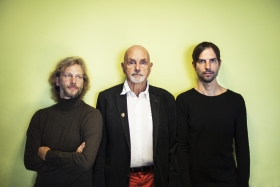

In 1973, Roedelius and Moebius linked up with Michael Rother—guitarist of NEU! and an early member of Kraftwerk—to form the Krautrock supergroup Harmonia. Their debut album Musik Von Harmonia synthesized Cluster’s avant-garde experiments into gooey globs of melody pouring out like oozings from the detergent bottle on its cover. Today, it is viewed as one of the most influential recordings of its era. Yet, at the time of its release, Roedelius and Moebius struggled with the strenuous rehearsal schedules of their newfound bandmate.
“It was more or less just jamming,” Roedelius laughs. “We were always rehearsing in the studio or in front of an audience, trying to find our own musical language—which we did. Afterwards Moebius and I had to tell Michael that we didn’t want to play the same songs over and over again. That wasn’t Cluster’s aim.”
When Brian Eno visited Germany in the late ’70s to produce David Bowie’s trio of albums Low, “Heroes,” and Lodger, he also joined Cluster in the studio for their collaborative collections Cluster & Eno and After The Heat. Several decades later, it was revealed that Eno had also stayed at Roedelius’ countryside home for seven days in 1975 while recording with the members of Harmonia. These four-track tape sessions were only released twenty years later as the album Tracks & Traces.
While the original audio quality may have been the source of Tracks & Traces’ two-decades shelving, it’s impossible, listening today, to understand why the recording was held back. Highlights abound, from the sputtering motorik of “Almost” to the melancholy melody of “Atmosphere.” Echoes of Eno’s “By This River” appear in the similarly titled “By The Riverside,” while his instantly recognizable vocals emerge from the haze on “Luneberg Heath,” a song that could have been a classic of the 1970s. “The material was considered so disastrous that no one really thought about using it, but I kept copies of the tapes,” Roedelius explains. “I thought it was beautiful music—because it was. Twenty years later I discovered a method to clean the tapes called Sonic Solution. I brought it to a studio to work on the recordings without asking the others. They were astonished that I didn’t discuss it with them, but agreed to release it, after all, because it sounded so nice.”
“Brian would get up in the morning and ask me, ‘How can I get these guys working a little bit harder?’” Christine Martha adds with a smile. “I said, ‘Just put a little piece of paper near them and write down what you want them to do.’ We had to work hard to survive, though. Our house had big chimneys and we needed a lot of wood to warm up the fire and the stove.
Achim [Roedelius’ nickname] brought a saw for Brian and told him he had to come with us to the forest,” she continues. “He asked them to do more work in the studio, so they asked him to chop some wood. Brian would sit down with his abacus and say, ‘Look, Martha, if they worked harder at music, we could buy the wood.’ I said, ‘Brian, we don’t want that. We like to go to the woods, collect mushrooms, and do this work by hand.’ Brian did a bit of chopping, but was a lot happier organizing the guys in the studio.”
These days, Roedelius is supported by organizations such as Germany’s Goethe-Institut, allowing him to travel for performances around the world. He has two new albums set for release, and the couple are also preparing for the fifteenth edition of their More Ohr Less music festival in August 2018. Set on a floating stage in the glacial lake of Lunz am See, two hours from Vienna in their adopted home country of Austria, the festival and its location are fitting for a musician who has always drifted against the current.
Reflecting again on the origins of Krautrock, the umbrella term created by English speakers in the early ’70s is revealed to be one form of organization that Roedelius truly appreciates. “Krautrock wasn’t a joke,” he says in a rare moment of seriousness. “Critics had to categorize the music from Germany, and for most of the groups that existed at the time, it fit. Almost everyone was influenced by rock clichés, and copied them in a way; but not Can, Kraftwerk, NEU!, and not Cluster. We were always beside the stream.”
Top photo by of Hans-Joachim Roedelius performing at Monarch tavern in Toronto (Oct. 2017) by: Tom Swift. Qluster photo by: Alexander Gehring.
